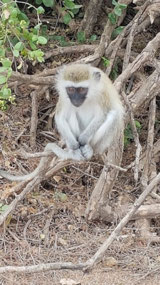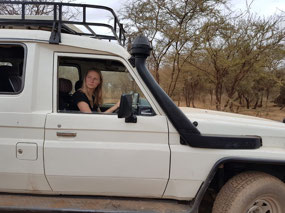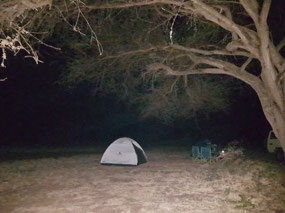After 36 hours traveling, we definitely had some sleep to catch up, and don't wake up until nine o'clock. After breakfast we continue our safari by following the trails along the swamps. Again we see lots of elephants, but also many birds, giraffes, hippos, warthogs, zebras, baboons, wildebeest etc. Amboseli is a relatively small park, but it has many animals.
We are debating if we want to stay another day, but Lucie has told me that Tsavo West is only a couple of hours away, so we break camp.
While working, Lucie comes by to ask if we are really leaving. She helps packing the plastic sheet, and I can see she is hoping for a bakshis, so when we finally say goodbye, I give her some shillings, which makes her very happy.
Coming from a country where tips don't really exist anymore, I find it hard to remember to give tips, and even harder, to know how much to give. In a country where poor people earn $15 per day, you would think that $1 is a reasonable tip. But in Tanzania I found that some expect $20 from a mzungu (white man). But for me as a cheap Dutch, I can't remember ever giving such a tip.
Once more we pass the flamingos for some last pictures, then we head east to leave the park. The ranger tells us it is a full day trip to Tsavo, and recommends we leave tomorrow morning.
Problem is that distance does not mean much here. The quality of the roads determines everything.
We decide to go by Lucie, and we depart. ...and Lucie does not disappoint. The first 40km the road is gravel, but then we hit the tarmac and we make progress.
Along the way we get diesel, but the credit card system does not function, so we have to pay with cash. An ATM may be needed in the near future.
A hand written sign points to Tsavo, and the good roads are over. But after the Serengeti Kari is an old hand, and with confidence she shoots over the gravel, avoiding potholes bigger than our wheels, and occasional skidding to a complete stop when the whole road is traversed by a gully.
Around us is much rough and unused land, yellow grass and stubby, thorny trees. Any houses are made of corrugated iron, dried manure, or a solid one of bare concrete. Sometimes a child or adult crosses the road with a flock of goats.
A bar crosses the road. Two soldiers with fatigues in a rickety booth stare at us. I get out of the car.
'Jambo!'
I see two smiles. 'Jambo. Karibu.'
'Safi sana. Asante.'
Big smiles now, and laughing. I reach out my hand and shake hands the local way: a normal handshake, followed by a shake holding thumbs, finished by a normal handshake. We are friends now.
I inform about Tsavo, and the road, I register us and the car, and we continue over the horrible road.
It is late afternoon now, and overcast, so it's getting darker. We rattle on for another 45 minutes or so, when we reach a gate with some shacks. At the shacks we meet some people in various old t-shirts who are guards and rangers.
After some talking they start to fill out forms in a corrugated iron bin with a solar panel on top and batteries inside. They are proud of their modern equipment.
But paying with the credit card happens outside near the top of a local hill, where the signal is better.
Unfortunately the connection is not good enough, and we can pay in a lodge tomorrow.
We continue and pass a large lava field - it looks like plowed asphalt, and strange enough nothing grows on it - a significant point of interest here, and at twilight we reach an empty campground, where Didi and Kari manage with flashlights to find the water supply and hook it up. By then it is night, and by the car lights we pitch the tents.
Outside we hear many sounds, and we were told leopards are in this area. It makes for a fantastic night in the wilderness.

 Tsavo West National Park, Kenya
Tsavo West National Park, Kenya







2025-05-23